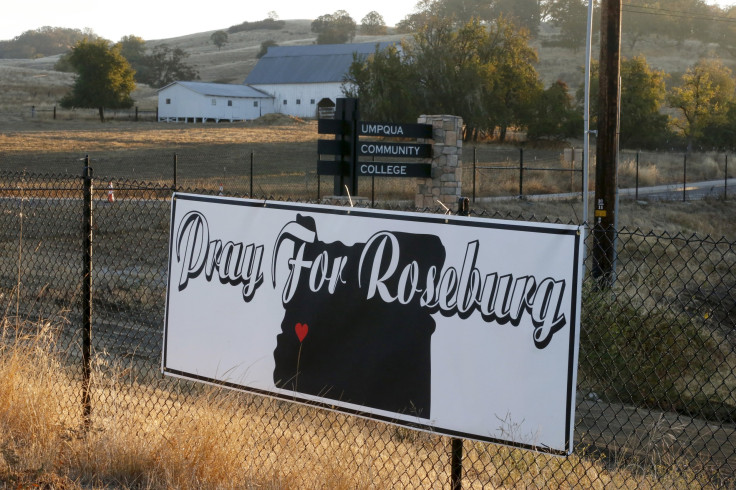Christian Killings In America: Oregon College Shooting Victim's Father Alleges Attacker's Religious Bias

The shooter who gunned downed nine people Thursday at an Oregon community college this week made a chilling request before he opened fire. He reportedly told students who had dropped to a classroom floor to stand up if they were Christians.
To those who stood, the gunman said, “Good. Because you're a Christian, you're going to see God in just about one second.” That account was given by the father of Anastasia Boylan, a student at Umpqua Community College in Roseburg, Oregon, who claimed the shooter singled out Christians during the massacre that left both fatalities and multiple people injured. Boylan was among the injured and survived the shooting by playing dead, CNN reported.
Proven violent incidents in which Protestant Christians are targeted have been rare in the U.S., according to the FBI's most recent hate crime statistics. People of Jewish and Islamic faith are more often the targets of domestic religious persecution, while Christians abroad have faced growing deadly violence. But that truth has not stopped some Christian clergy, politicians and conservative pundits from claiming the contrary when it fits their political aims.
Protestant Christians and Catholics were the targets of just 3 percent and 7 percent, respectively, of approximately 1,031 religious hate crimes in 2013, according to the FBI. Jews in the U.S. account for 61 percent of victims in religious hate crimes, and Muslims accounted for 13 percent.
For Muslims, hate crimes based on religion spiked after the Sept. 11 terror attacks in New York City and Washington, D.C., in 2001. There were nearly 500 hate crime incidents against Muslims that year, according to federal data, and such attacks have hovered at five times the annual rate that existed before the 9/11 attacks 14 years later.
Right-wing Christian conservative and former Republican U.S. Sen. Rick Santorum of Pennsylvania, who is currently a candidate for the Republican presidential nomination, recently stirred controversy for evoking the Columbine High School shooting to make a point about religious liberty for U.S. Christians. During last month’s GOP presidential debate on CNN, Santorum linked the story of a religious court clerk in Kentucky jailed for refusing to issue marriage licenses to same-sex couples and a Columbine shooting victim who was reportedly asked whether she believed in God.
Critics of the comparison have said Santorum incorrectly referenced the story of Valeen Schnurr, a student shot during the 1999 massacre in Columbine, Colorado, who was asked about her religious beliefs by gunman Dylan Klebold. Schnurr survived the attack, but another student who died in the shooting had recently been “reborn” as a devout Christian. Conflating the right of conscientious objection to religious persecution was in poor taste and misled the public about injustice against people of faith, wrote Goldie Taylor, a national political pundit.
Some members of the public have questioned whether Christian beliefs are under siege, particularly after the U.S. Supreme Court validated same-sex marriage nationwide. George Zimmerman, the man acquitted in 2013 of fatally shooting black teen Trayvon Martin in Sanford, Florida, tweeted his reaction to the Oregon community college shooting Friday.
Kill my Christian brethren, I will take the life out of you and everyone you loved.
Si Vis Pacem Para Bellum
Read: http://t.co/3lmhnUEIXj
— George M. Zimmerman (@TherealGeorgeZ) October 2, 2015Federal and most state authorities have prosecuted crimes related to the religion of the victim. Dylann Storm Roof, the 21-year-old accused gunman in the massacre that killed nine black churchgoers during a Bible study session in Charleston, South Carolina, last June, faces a charge of “obstructing the practice of religion” after being indicted on 33 hate crime offenses in July. Roof is eligible for the death penalty and has pleaded not guilty.
In the last year, the persecution of Christians globally has been a theme among messages coming from Protestant and Catholic leaders. Pope Francis, who wrapped up a six-day visit last week to the U.S., has blasted the world’s “complicit silence” as thousands of Christians were killed by Islamic militants in the Middle East and northern and eastern Africa. During his Easter address earlier this year, Francis referenced the massacre at Garissa University College in eastern Kenya, in which al-Shabab militants singled out non-Muslims and killed at least 148 people in April. Islamic State militants in Libya beheaded 21 Egyptian Christians in February.
Researchers for Open Doors USA, a group that advocates for persecuted Christians, found that 4,344 Christians were killed in faith-related attacks between December 2013 and November 2014, according to a Washington Post report. On the issues, Christian activists have decried the silence of leaders in the U.S., one of the most Protestant countries in the world.
“I think some people would say that they’re fueling Islamophobia [by saying Christians were targeted], but that’s not really what we’re talking about,” David Curry, president of the nonprofit Open Doors USA, told the Post in April. “We’re talking about identifying the ideology of extremists” and not mainstream Muslims.
© Copyright IBTimes 2025. All rights reserved.






















